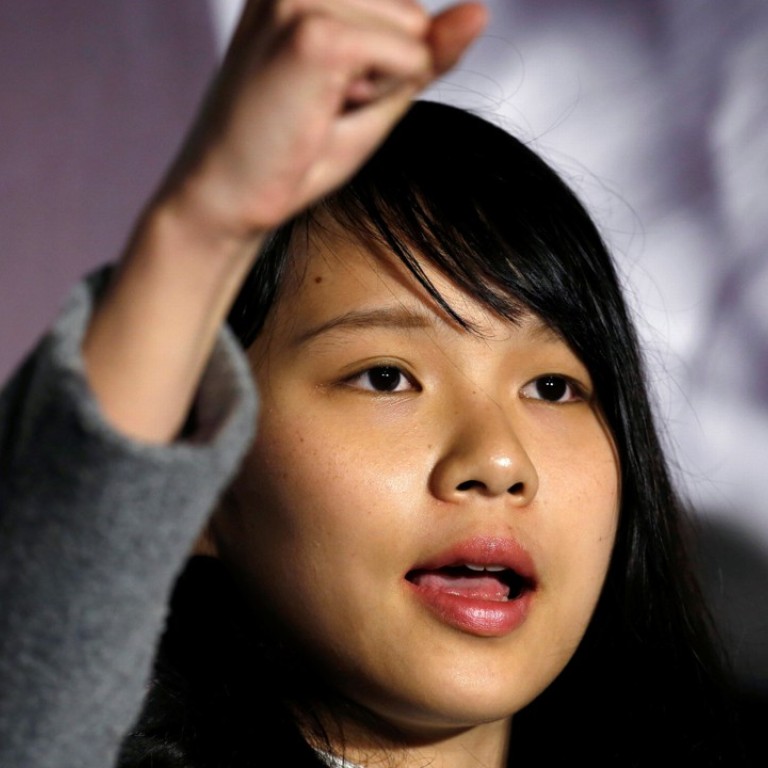
Letters to the Editor, January 31, 2018
Government needs to heed young voices
The move provoked a political storm, and outrage among pro-democracy activists and citizens, further damaging relations between the government and the public.
Whatever Chow’s political views, as a student, I am proud of her for standing up and speaking up for us. In today’s society, having a stable job and income are the bare necessities of life. Many politicians, especially those in the opposition, have sacrificed a lot just to let our voices be heard, especially those of fresh graduates entering the job market and facing disillusionment about their prospects in terms of property ownership or climbing up the social ladder. Activists such as Chow are putting their futures on the line to let our voices be heard.
The government must know that the voices that oppose it actually help Hong Kong to improve, and help it to correct its mistakes. I sincerely hope the government will let young voices be heard and not use various methods to silence them.
Natalie Cheng, Yuen Long
Teresa Cheng row highlights property woes
For the rich, multiple flats are a testament to their purchasing power. In times of inflation, they simply sell their flats for greater profit. Some of the rich, like Teresa Cheng, may overlook the presence of enhanced areas in their luxury residences to enjoy a more comfortable home.
We are reminded of the previous Hong Kong chief executive, Leung Chun-ying, who was also accused of having illegal structures at his houses on The Peak. That led to Leung issuing a 30-page document in November 2012, explaining the illegal structures and admitting mistakes but insisting his integrity was intact.
Cheng, like Leung then, holds a high position in government. Such highly placed officials have the responsibility to be role models for society, instead of being the focus of scandals. Also, if found guilty, they should face appropriate punishment, even if they are long-serving civil servants.
However, apart from the integrity issue, this case highlights the intense focus on property in Hong Kong life, as Buildings Department figures from the past 18 years suggest at least one in four properties has unsanctioned features.
Many Hongkongers have to save for decades and cut down on daily expenses to be able to afford even a 400 sq ft flat. Thus, they may be tempted to secretly construct some extra areas for themselves, to improve their living conditions.
Hong Kong has the dubious distinction of being the world’s most expensive property market. That is what needs to be tackled first.
Teresa Ng, Hang Hau
Illegal features fuel ‘different strokes’ debate
I refer to the public uproar over illegal structures at the new justice minister’s homes.
Illegal structures are a serious problem in Hong Kong and the matter should have been resolved years ago, but for some reason has been ignored by both the government and the public.
The issue was buried for a while until the controversy broke over Secretary for Justice Teresa Cheng’s homes.
It is funny that Cheng should seem to make light of the issue and insist that she is not a “a person without integrity”.
Look at the Baptist University students who swore at their teachers. They were duly taken to task and suspended.
Watch: Row over Mandarin test at Baptist University
Surely swearing is a less serious offence than for government officials – the justice chief, no less – to have illegal structures at multiple homes?
But while the students were duly punished, the justice secretary is still skirting the issue. Is this fair?
All this has done is spark heated debate on social media on whether the authorities treat some people more favourably than others.
Michelle Mai, Sau Mau Ping
Warming to sharing habits begins at home
A survey showed ride-hailing and shared accommodation services are not as popular among Hongkongers as they are among those from the mainland, for instance. A technology firm polled 300 people in the city about their travel habits and found that 86 per cent never or seldom used ride-hailing or hospitality rental services abroad.
This reluctance abroad has been attributed to the lack of government endorsement at home for services like Uber. This is in contrast to the mainland, where almost everyone uses the ride-hailing app Didi Chuxing.
Locally, such app services also face opposition from the taxi business. Even the Consumer Council has rebuked the Hong Kong government on its failure to embrace ride-hailing services. So we find that, despite the better service quality overall of Uber, the original taxi service is still mostly used by both locals and tourists.
To make the sector more competitive, the Hong Kong government should accept the sharing economy and allow more foreign firms to invest in it.
William Wan, Clear Water Bay

